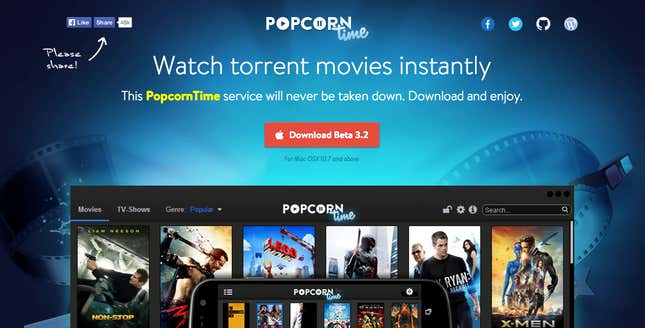Online streaming companies are booming. Netflix has now amassed more than 46 million paying subscribers for its video content, both original and licensed. Spotify has convinced 10 million people to pay it each month for unlimited and offline access to its vast library of music.
Yet just as the entertainment industry thought it had figured out how to convince people to pay for content (basically, simple pricing structures and easy, well-designed interfaces), along comes a new wave of illicit file-sharing services designed to look like they are legal. These services are “a big switch from the past where there were popups, spammy, risqué looking sites,” BTIG analyst Rich Greenfield says in an email. “These look and feel legit.”
The most prominent of them is a video file sharing site called Popcorn Time, which has been described by Ars Technica as a “Netflix like-app” that “reinvents the seedy process of torrenting.” Torrenting is the file-sharing method whereby large files are split into multiple pieces stored on many computers on a network, which both makes the file easier to share efficiently and makes the responsibility for piracy harder to pinpoint. Torrenting sites can argue that they’re not breaking the law because they’re not hosting any copyrighted content themselves, which is why law-enforcement agencies have had only patchy success against sites like the Pirate Bay.
The original developers of Popcorn Time, a self-described “group of geeks from Buenos Aires,” said they were abandoning it in March. They insisted the product was legal (“We checked. Four Times.“) but added mysteriously that “standing against an old fashioned industry has it’s [sic] own associated costs,” and that they were dropping the project because ”we need to move on with our lives.”
However, two versions of Popcorn Time continue, at www.time4popcorn.eu and popcorntime.io.

The first, pictured above, proclaims that “user’s safety comes first” and recently included a VPN with the software that allows people to use it anonymously (and thus not get caught). The service is even available on Android devices, a fact rather brazenly advertised with this YouTube video (warning, some of it is explicit):
The second site claims to be made by “a bunch of geeks from All Around The World” and contains this warning:

In streaming music, meanwhile, a professional-looking file-sharing service called Hip Hop began to garner attention:
However, it looks like the service has already been shut down. Its Twitter account, @gethiphopapp, has been deleted, and its website now contains the following message:
HipHop started as a technical challenge between friends. The recent success wasn’t expected, and we took the entire project down this morning.
We are all users of paid music services and we do believe in artists getting paid for their creations.
If you do like music, there is a lot of amazing services out there: Deezer, Spotify, Rdio, …
That being said, the service’s GitHub page says “we will be back soon.”